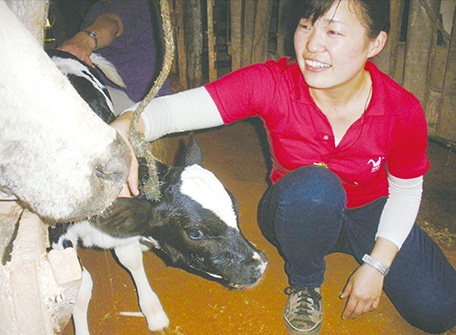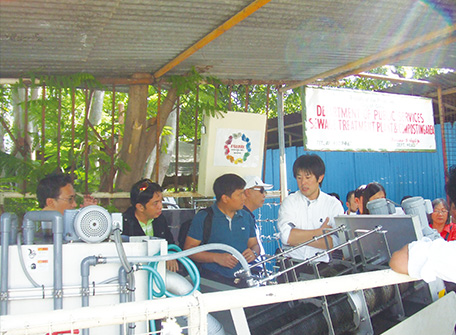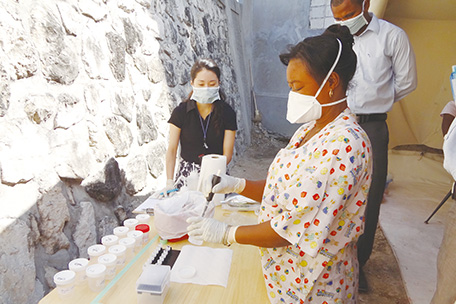Japan's Official Development Assistance White Paper 2013
Section 2 Partnering with Diverse Actors Linked by ODA
In recent years, assistance and activities carried out by a range of actors, including non-governmental organizations (NGOs), private foundations, and private companies, have gained importance in the context of the development of developing countries. Furthermore, actors such as local governments which were rarely directly involved in the development of developing countries have begun to proactively engage in development. Corporate involvement has also taken on diverse forms, ranging from development assistance extended as social contribution by Japanese companies which do business in developing countries, to initiatives implemented as a vital business component. As described above, various actors are engaged in the development of developing countries, using diverse approaches which leverage the areas they respectively excel in. ODA can link these diverse actors, and by adopting solid approaches, increase the synergy effect. This section introduces several cases in which partnerships between these new actors in development and the Government have created larger impacts.
The first case is an example of a company and NGOs partnering with ODA in Haiti. In Haiti, tuberculosis is rampant and early testing and treatment as well as infection prevention efforts are needed. In January 2013, a Japanese company, EIKEN CHEMICAL CO., LTD., in cooperation with the Japan International Cooperation Agency (JICA), launched a program to enhance Haiti’s tuberculosis diagnosis capabilities by introducing and mainstreaming in Haiti a highly sensitive and simple tuberculosis testing method developed by the company. More specifically, EIKEN CHEMICAL provides the reagents and supplies necessary for the implementation of this testing method. In addition, the company dispatches to Haiti physicians who serve as trainers and conduct trainings on the testing method for local laboratory technicians at the Haitian laboratory carrying out the testing. JICA pays for the cost of dispatching experts from the Research Institute of Tuberculosis, Japan Anti-Tuberculosis Association (JATA), which offers technical support for this training, as well as experts from NGO, RESULTS Japan, which has knowhow in spreading awareness in developing countries. This is a case in which the dispatch of personnel from a relevant NGO and research institute through ODA for a Japanese company’s social contribution project in the medical field contributed to building up Haiti’s tuberculosis diagnosis capabilities and controlling the spread of infection, and considerably contributed to improving the welfare of the Haitian people.
The second example is partnership between universities and ODA. Obihiro University of Agriculture and Veterinary Medicine is the only national university in Japan specializing in veterinary medicine, agriculture, and livestock. While it has always been dedicated to undertaking progressive research through partnerships with other universities and research institutes in the area, Obihiro University also proactively engages in international cooperation. Obihiro University and JICA signed the Obihiro - JICA Volunteer Team Partnership Program Memorandum of Understanding, under which the university dispatches students and graduates using the Japan Overseas Cooperation Volunteers (JOCV) system to the Itapua department government office and to three city offices in the same department in Paraguay in South America. Students continuously cooperate with the implementation of the capacity-building program to help small-scale dairy farmers in the department improve their milk productivity and milk quality, and contribute to the development of dairy farming in Paraguay. At the same time, participating students receive university course credit for the dispatch activity. As students are able to obtain field experience in a developing country that goes beyond the scope of a mere exercise, this project is also drawing attention from the perspective of global human resource development.

A JOCV (Obihiro University of Agriculture and Veterinary Medicine student) paying a routine visit to a farm in Paraguay (Photo: Obihiro University of Agriculture and Veterinary Medicine)

A member of a sludge dewatering equipment development company explaining about the equipment to the Cebu City public services department team (Photo: AMCON INC.)

A technician performing tuberculosis testing in Haiti (Photo: Eiken Chemical Co., LTD.)
The “Project for the Promotion and Enhancement of the Afghan Capacity for Effective Development (PEACE),” a project implemented with the cooperation of several Japanese universities to foster human resources who will be responsible for Afghanistan’s future, supports the training of Afghan administrative officers in the areas of agriculture, engineering, and social science (See this page, for more details of PEACE Project in “Peacebuilding”).
As new development partners, the importance of local governments has also increased. A variety of local governments currently provide international cooperation by drawing on their respective knowhow in administrative services. The example of the City of Yokohama is described below.
The City of Yokohama and the City of Cebu in the Philippines exchanged the “Memorandum of Understanding on Technical Cooperation for Sustainable Urban Development” in March 2012. Under this MOU, the City of Yokohama implements technical cooperation in partnership with the private sector, making use of the technologies of private companies and of the City of Yokohama’s various knowhow in urban management and urban development including in water and sewage, waste management, urban planning, and environment protection measures. In accordance with this MOU, in FY2012, the City of Yokohama conducted a study to examine the urban development vision of Metro Cebu (urban area consisting of 13 municipalities, including the City of Cebu).
Additionally, the City of Yokohama cooperates with an array of training and dispatch programs carried out through ODA. Further still, the City of Yokohama, in partnership with over 100 relevant companies and groups in the city, launched the “Yokohama Water Business Conference (YWBC)” covering the whole spectrum of water and sewage services. Under YWBC, the city and private companies collaborate to resolve water issues of countries, including emerging countries. For example, in the City of Cebu in the Philippines, sludge that has accumulated in household and office septic tanks is not properly disposed of, and is a source of water contamination and the unhygienic environment. Accordingly, a member company of the Water Business Conference made a proposal to improve the hygiene environment in the Philippines by installing dewatering equipment, which was adopted as one of the commissioned Feasibility Study projects that were selected for supporting overseas expansion for SMEs using ODA in FY2012 of the Japanese Ministry of Foreign Affairs (MOFA). This example shows that Japanese local governments’ various attempts at international cooperation contribute to the development of developing countries in all shapes and forms through government-company partnerships.
